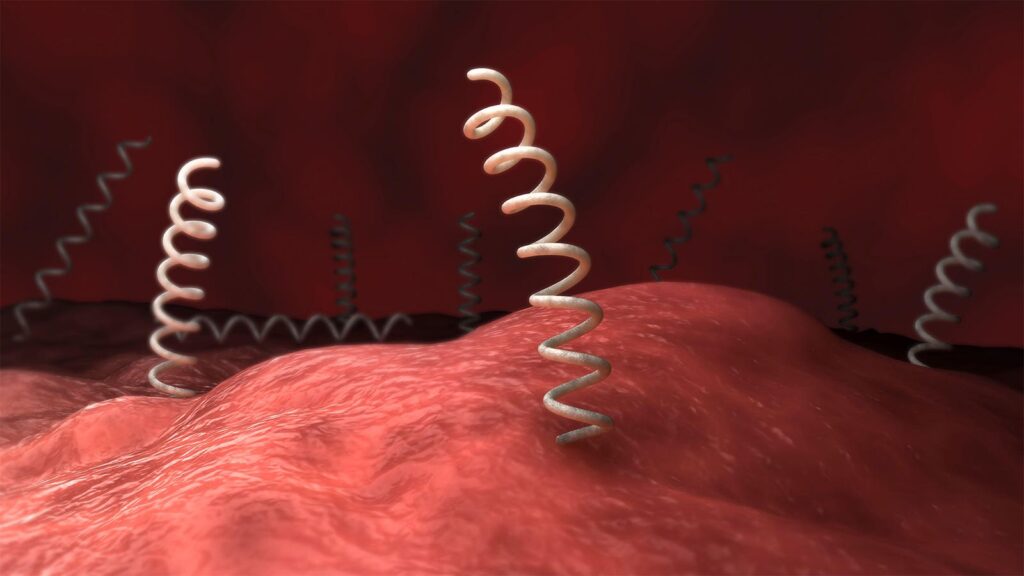Linezolid failed to meet noninferiority criteria when compared with standard benzathine penicillin G (BPG) in the treatment of early syphilis, according to findings of the randomized, controlled Trep-AB Study of cisgender men.
Only 70% of trial participants with early syphilis who were treated with linezolid were cured, compared with 100% of participants treated with penicillin, reported Oriol Mitja, MD, PhD, from the Hospital Universitari Germans Trías i Pujol in Badalona, Spain, and colleagues in Lancet Infectious Diseases. Because of these results, the trial was terminated early.
The results were disappointing, given that the Trep-AB Study was one of only a handful of randomized controlled trials to investigate new therapies for syphilis in the past two decades, Mitja commented in an accompanying Lancet interview. “Just think that over the past 14 years, only five randomized clinical trials have investigated syphilis, and specifically beta lactams and macrolides in early stages, so no RCTs [randomized controlled trials] have investigated other antibiotic families,” Mitja pointed out.
Participants in the linezolid group received 600 mg once daily for 5 days. Those treated with BPG received one intramuscular shot of BPG (2.4 million IU). Investigators defined the primary efficacy endpoint of treatment response as a composite of clinical cure, serological cure, and absence of relapse. Patients were followed over time for 48 weeks.
To assess whether changes in linezolid dosing regimens could improve the treatment response, researchers conducted a post hoc analysis using Monte Carlo simulation. Results of that analysis indicated that a dosing regimen of 600 mg twice per day for 10 days could achieve a probability of target attainment for clinical efficacy of 100%, Mitja said.
“Considering that T. pallidum is a slow-growing bacterium that spreads systematically, a longer duration of treatment and more frequent dosing is probably necessary, as pharmacokinetic simulations show,” commented Chrysovalantis Stafylis, MD, MPH, and Jeffrey Klausner, MD, MPH, from the Keck School of Medicine at the University of Southern California in Los Angeles, in an accompanying editorial.
The negative trial result should not discourage efforts to repurpose older, widely available antibiotics for syphilis, the editorialists urged. “This could be a fast, low-cost strategy, leveraging the known clinical profile and safety of antibiotics in use, thus simplifying regulatory approval and clinical adoption,” they wrote. “Identifying safer and alternative treatment options for syphilis must continue to be a high priority.”
Periodic BPG shortages across the globe highlight the need for alternative treatments for syphilis, Mitja and co-authors wrote. According to the WHO, of the over 6 million cases of syphilis that occur worldwide each year, 1 million of those occur in pregnant women and BPG shortages result in more than 661,000 of congenital syphilis cases each year. Moreover, approximately 5% to 10% of pregnant people are allergic to penicillin, and doxycycline, the only other effective alternative, is contraindicated during pregnancy, the authors explained.
The Trep-AB Study was an open-label, non-inferiority, randomized, controlled trial that recruited participants diagnosed with primary, secondary, or early latent syphilis from three clinics in Catalonia, Spain. Fifty-nine participants with syphilis were randomly assigned to receive either linezolid or BPG. The average age was 37.6 years and all participants were men.
After treatment, investigators monitored participants for signs and symptoms of syphilis at regular intervals and also performed serological testing to assess for clinical recurrence or non-response to treatment. If patients experienced clinical recurrence or had serological evidence of non-response or relapse after treatment, they were treated with one dose of BPG and monitored further until they achieved a complete cure. In patients who had a clinical recurrence, investigators used an innovative approach to differentiate relapse from reinfection using multilocus sequence typing and whole-genome sequencing to analyze the genetic profiles of Treponema pallidum isolated from participants.
Overall, 19 of 27 participants in the linezolid group and all 28 participants in the BPG group met the all three components of the composite endpoint, with a treatment difference of -29.6% (95 % CI -50.5 to -8.8).
Among patients assessed for clinical cure, 88% (n=16) participants in the linezolid group had a clinical cure versus 100% (n=17) in the BPG group. Of those assessed for serological cure, 91% who were treated with linezolid (n=23), had a serological cure versus 100% (n=24) in the BPG group. (Participants with early-latent, asymptomatic syphilis were not assessed for clinical cure and those with primary syphilis who had a negative serology at baseline were not assessed for a serological cure.)
In the linezolid group, 85% of participants did not relapse after treatment, but there were zero relapses in the BPG group. Adverse events, mostly mild to moderate, occurred at equal rates (17%) among both treatment groups.
The authors noted that the study included individuals with different stages of syphilis that may have affected treatment outcomes. For example, the failure rate in secondary syphilis was higher than in other stages of the disease, they said. In addition, the study was not masked due to different administration routes for linezolid and BPG. All participants were men, so the results are not generalizable to the female population.
Katherine Kahn is a staff writer at MedPage Today, covering the infectious diseases beat. She has been a medical writer for over 15 years.
Disclosures
The study was funded by the European Research Council and the Fondo de Investigaciones Sanitarias from Instituto de Salud Carlos III.
Mitja reported no conflicts of interest. Several co-authors reported ties to industry.
Stafylis and Klausner reported no competing interests.
Primary Source
The Lancet Infectious Diseases
Source Reference: Ubals M, et al “Oral linezolid compared with benzathine penicillin G for treatment of early syphilis in adults (Trep-AB Study) in Spain: a prospective, open-label, non-inferiority, randomised controlled trial” Lancet Infect Dis 2024; DOI: 10.1016/S1473-3099(23)00683-7.
Secondary Source
The Lancet Infectious Diseases
Source Reference: Stafylis C, Klausner JD “Repurposing antibiotics to treat syphilis” Lancet Infect Dis 2024; DOI: 10.1016/S1473-3099(23)00693-X.
>>> Read full article>>>
Copyright for syndicated content belongs to the linked Source : MedPageToday – https://www.medpagetoday.com/infectiousdisease/stds/108259
